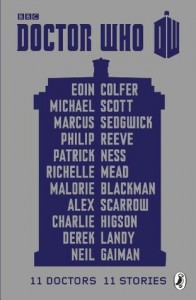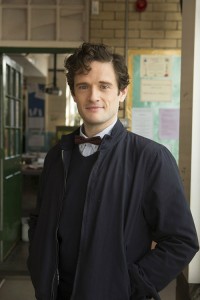 Reading Eleven Doctors, Eleven Stories has been an interesting experience.
Reading Eleven Doctors, Eleven Stories has been an interesting experience.
Over the course of last year, these short stories got released as e-books, in celebration of the 50th anniversary of the Doctor Who series. Here, they’re collected in a chunky volume, wrapped in a silvery cover.
Physically, it represents an imposing read. I have read more imposing books – books with 1,000+ pages that threaten to break your wrist while reading. Worse yet, they have the potential to break your nose if you read them in bed. I imagine some slimming might have been achieved with a slightly smaller typeface.
Anyway… content. I had intended to ruminate on the reading rather than the carrying.
It has been a mixed experience. It’s hard to tell whether the best stories come down to writers capable of capturing a character in print so effortlessly, or if some Doctors just had more distinctive personalities.
Take the Ninth Doctor, for example. Charlie Higson‘s “The Beast of Babylon” benefits no end from his getting the style, manner and speech patterns of the Doctor down pat.
While Derek Landy’s “The Mystery of the Haunted Cottage” could have done with more time and space to expand into a satisfying story, he manages a similar feat to Higson and David Tennant’s performance comes through, staccato-style and peppered with brilliant.
Less successful is Eoin Colfer‘s “A Big Hand For The Doctor“, a story of an injured first Doctor up against a gang of child-stealing pirate-aliens. Not only does he not get the feel of the Time Lord right, but he seems to struggle against the way we have come to perceive the Doctor.
Because the TV series has developed and the passage of time means that Who in the 60s or 70s comes across as very much of its time, it’s something you have to suspend disbelief for. The First Doctor doesn’t reference Harry Potter much in the original TV series because, well, he didn’t exist. Yes, The Doctor travels in time and so making reference to actual stuff of the present day makes perfect sense… but, reading it, little things like this just jar slightly. They feel wrong.
On top of that, the first story has a twist in the tale that just didn’t sit well with me. I saw it coming far too early and didn’t enjoy it much when confirmation struck home at the end.
To be fair – and so as not to warn you off – the good stories in this volume easily outweigh the less good. The Sixth Doctor’s story stands out as another one to avoid, but that’s just two out of eleven that made me wish I’d spent my time more wisely. We follow the Sixth Doctor’s adventure from Peri’s perspective – and it doesn’t feel right. It doesn’t feel very Peri, for a start – and something about the egotistical Sixth Doctor means a story told from another character’s perspective doesn’t sit well.
For anyone running Doctor Who roleplaying sessions, I can see several stories providing a basis for adventures. The Third Doctor’s “The Spear of Destiny” has all the potential for a rip-roaring gaming session, with frozen woods, rampaging Scandinavians, and warring almost gods. The Fourth Doctor’s “The Roots of Evil” takes place in the fascinating setting of a living tree space station… which sounds like a great place for a game – and warrant further consideration, as the story identifies the example herein as an unusual example of what would otherwise be an enormous terraforming construct.
Definitely worth reading, even if you just grab copies of the individual e-books. I’m almost finished with the final story – by Neil Gaiman – and then I’m off to find something new to read.








